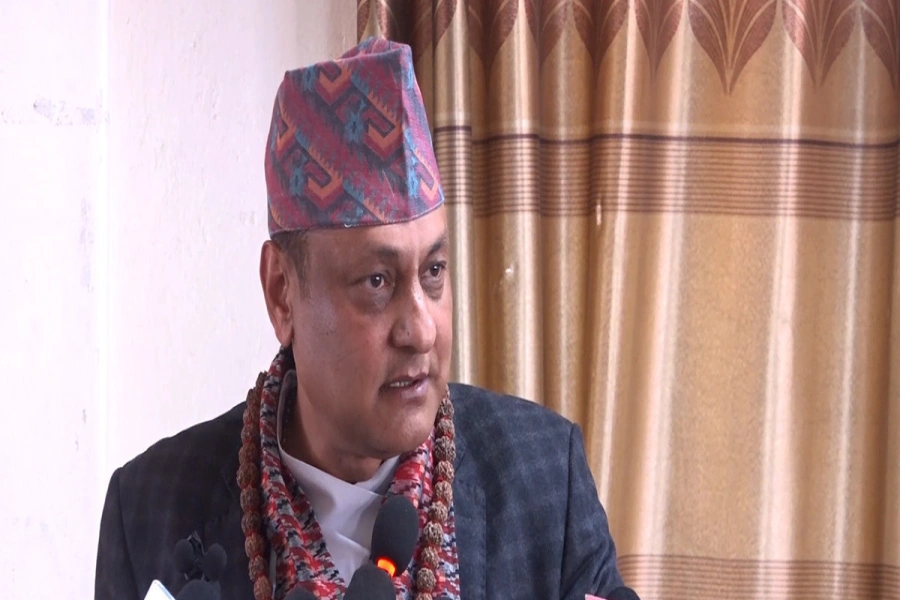Many practical difficulties in criminal law
KATHMANDU, July 21: Highlighting practical issues in the country’s criminal law, an advisory task force has suggested lowering maximum minor age and keeping minimum marriage age at 18 years. A nine-member advisory task force, chaired by the then attorney general, has recommended to the government that it is suitable to lower the maximum minor age and set the minimum marriage age at 18 years. Currently, the law sets the maximum minor age at 18 years and the marriage age at 20 years.
In the report submitted to the government, the task force has suggested a review of the issues identified in the law. The report, titled "Criminal Justice Administration Reform Study and Reform Report – 2081," highlights numerous practical difficulties within the existing legal framework.
The task force has submitted a report with recommendations for reforms in the criminal law and its structure. The report identifies inconsistencies in the National Criminal Code and other specific laws, and suggests ensuring uniformity in aspects such as penalties, punishments, and fines.
The report suggests, "It is appropriate to set the marriage age at 18 years. The crime of child marriage should be defined as marrying before reaching the required age, and it is suitable to reduce the maximum minor age." However, the report does not specify the maximum minor age. Additionally, due to the lower penalties for coercive sexual offenses, the report recommends establishing legal provisions for consensual sexual relations among minors with reduced penalties.
Govt task force proposes to provide professional license for dr...

Based on the suggestions received from interactions across all seven provinces, various recommendations have been provided to the government to address the issues encountered during the implementation of the National Criminal Code-2074 BS. The report suggests, "Given the feedback from stakeholders and officials indicating the need for a review of the context of maintaining the age of 18 as the maximum threshold for minors, further study and revision appear necessary."
The then government formed a task force on criminal justice administration reform under the coordination of the then attorney general Dinmani Pokhrel on February 1, 2024. The nine-member task force, which was given six months to study and provide recommendations, interacted with stakeholders on criminal justice at the provincial level. Based on the suggestions received, the task force prepared a report and submitted it to the then Prime Minister Pushpa Kamal Dahal on July 13.
The task force has identified areas for improvement in the Criminal Code. It has recommended removing laws that involve double criminalization. The report notes that the existing provisions were repeated due to a lack of amendments to the pre-existing laws before the code was established. Additionally, it has suggested that crimes committed by innocent collaborators should also be recognized as offenses.
For example, it is suggested that the law should include provisions to hold individuals criminally liable for offenses committed using animals, machinery, or artificial intelligence for a specific purpose. Currently, the law does not consider actions performed by innocent accomplices as criminal.
It is suggested to simplify the provisions related to accomplices, as they are currently unclear. The report also recommends addressing issues related to exemptions from life imprisonment. Additionally, the task force has proposed clarifying legal measures related to incitement to suicide, bringing human trafficking under legal jurisdiction, and amending the Vehicle Transport Act. "Since there is no legal system for treatment and punishment when a person is injured in a vehicle-hit, this should be addressed by enacting a law," the report states.
The report points out that the onerous confiscation provisions in the Forest Act are unreasonable. It also highlighted flaws in the legal system related to robbery and recommended amendments. The codes related to the administration of criminal justice have been in effect for over five years.
The report notes that while urgent needs have been addressed through general amendments to the law, issues that remain unimplemented should be studied and improved. It suggests that some legal provisions should be reviewed and updated in line with contemporary needs and social norms. It also highlights that certain matters criminalized by the Criminal Code are also covered by special laws, leading to duplication and implementation problems.
The report highlights that laws such as the Human Trafficking and Transportation (Control) Act-2007, the Narcotic Drugs (Control) Act-1976, the Act Relating to Children-2018, the Food Act-2023, the Explosives Act-2018, and the Black Market and Some Other Social Offenses and Punishment Act-1975 need to be reviewed. It also notes that procedural provisions in some special laws should be aligned with the provisions of the National Criminal Code.
The task force was assigned to identify weaknesses in the Criminal Code, criminal law, and sentencing determinations, as well as to address difficulties and problems encountered in their implementation. Additionally, the task force was asked to study and provide recommendations on issues related to legal duplications, consistency in penalties, and fines.
The task force has submitted a report that includes a study and analysis of the Criminal Code, as well as related criminal laws, procedures, and practices. The task force gathered suggestions from the Supreme Court, the Ministry of Law, Justice, and Parliamentary Affairs, the Nepal Law Commission, and other identified institutions and stakeholders involved in the field of criminal law reform.
In the task force chaired by the then attorney general Pokhrel, the members included government secretaries Phanindra Gautam and Liladevi Gautam, Registrar Bimal Paudel of the Supreme Court, Deputy Attorney General Sanjeev Raj Regmi, legal professionals, and police experts.





































